The Lemosho Route on Mount Kilimanjaro offers a captivating challenge for trekkers seeking an unforgettable adventure. This 8-day journey through Tanzania’s diverse landscapes combines stunning vistas, a gradual ascent, and expert guidance to heighten the chances of reaching the summit. With private transportation, meals, and camping equipment provided, climbers can focus on the thrilling task at hand. However, the demanding nature of the trek and the need for proper preparation and acclimatization underscore the importance of understanding the requirements and considering one’s fitness level before embarking on this extraordinary expedition.
Key Points
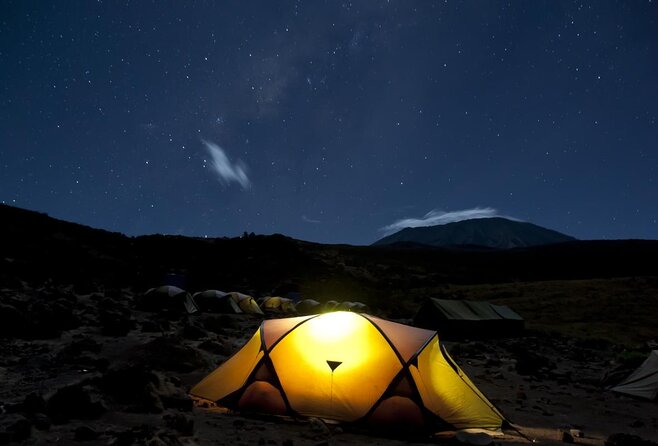
- The Lemosho Route is an 8-day trek to the summit of Mount Kilimanjaro, starting and ending in Moshi, Tanzania.
- The package includes private transportation, 2 nights of accommodation in Moshi, park fees, camping equipment, and 3 hot meals daily.
- Strong physical fitness, excellent cardiovascular health, and stamina are required to navigate the high-altitude environment of Kilimanjaro.
- Acclimatization and proper training are essential for a successful summit, with guides monitoring climbers’ progress to minimize altitude sickness.
- Tipping the experienced mountain crew is a common practice to acknowledge their hard work in supporting the climb.
Overview and Itinerary
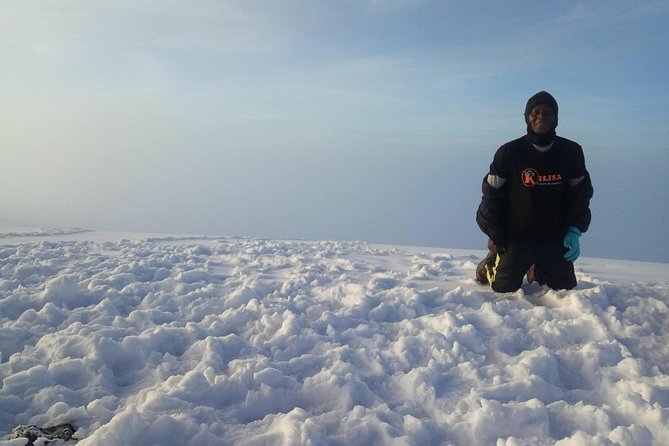
The Lemosho route is an 8-day trek that allows climbers to ascend Mount Kilimanjaro, Africa’s highest peak, starting from the western side of the mountain in Moshi, Tanzania.
The group size is limited to a maximum of 15 travelers, and the trek begins at 8:30 AM each day.
This route covers the entirety of the mountain, leading climbers back to the original meeting point upon completion.
Along the way, you will enjoy private transportation to and from the Kilimanjaro International Airport, as well as to and from the Kilimanjaro gate.
The trek ends with a return to the starting point in Moshi.
You can also read our reviews of more tours and experiences in Moshi.
Inclusions
This Lemosho route climbing package includes private transport to and from Kilimanjaro International Airport, providing convenient airport transfers. Plus, it covers 2 nights of accommodation in Moshi, allowing participants to acclimatize before the trek. The package also includes transportation to and from the Kilimanjaro gate, as well as all necessary park entry fees, camping fees, and Team Kilimanjaro Rescue fees. Participants will also benefit from 18% VAT on tour fees and services, sleeping mats, 4-season mountain tents, an emergency first-aid kit, portable oxygen tanks, and an oximeter, ensuring a safe and comfortable journey.
| Inclusions | Details |
|---|---|
| Transport | Airport transfers, transportation to/from Kilimanjaro gate |
| Accommodation | 2 nights in Moshi |
| Fees | Park entry, camping, Team Kilimanjaro Rescue |
| Equipment | Sleeping mats, tents, first-aid kit, oxygen, oximeter |
| Taxes | 18% VAT on tour fees and services |
Meals and Water
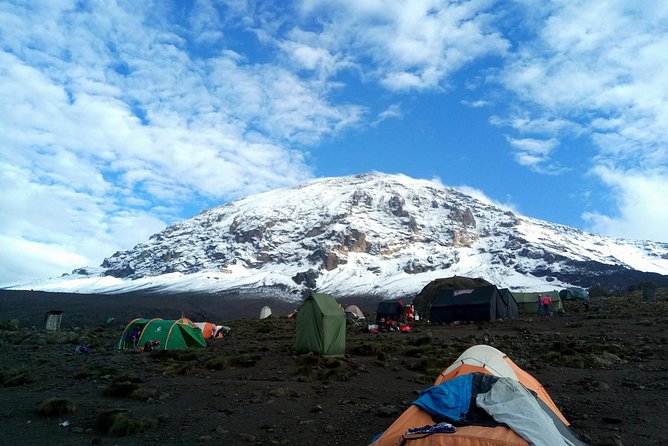
Providing 3 hot meals daily on the mountain, the package ensures participants are well-nourished throughout the trek.
Dinner (7), breakfast (8), and lunch (7) are included, allowing climbers to refuel and maintain their energy levels.
Complementing the meals, treated and filtered drinking water is available throughout the journey, with hot water provided for washing.
This comprehensive food and hydration plan caters to the physical demands of the Lemosho route, enabling trekkers to stay hydrated and energized as they ascend the iconic Mt. Kilimanjaro.
The variety of meals and reliable access to clean water are essential components of this immersive climbing experience, helping participants tackle the challenge ahead.
Health and Safety Requirements
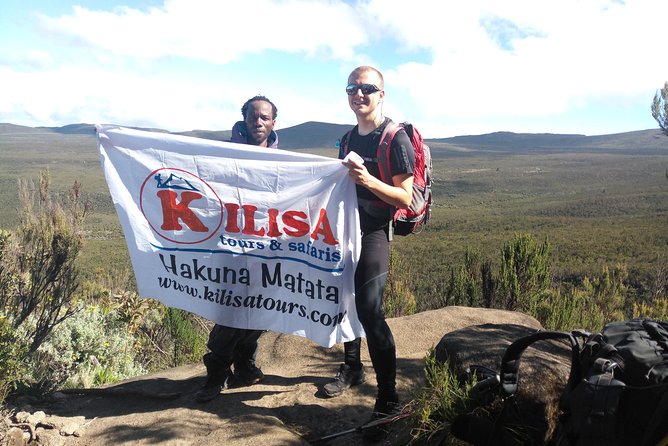
Due to the strenuous nature of the Lemosho route, the experience isn’t recommended for travelers with back problems, pregnant individuals, or those with serious medical conditions. Participants must possess a strong level of physical fitness to undertake this challenging climb.
The trek isn’t wheelchair accessible, and infants must be carried on laps during transportation. The high-altitude environment and demanding terrain require excellent cardiovascular health and stamina. Climbers will need to ascend and descend steep, rocky paths over multiple days.
Those with concerns about their physical abilities should consult a medical professional before booking this adventure. Safety is paramount, and the tour operator will provide emergency equipment like first-aid kits and oxygen tanks to ensure participants’ wellbeing on the mountain.
Pricing and Reviews
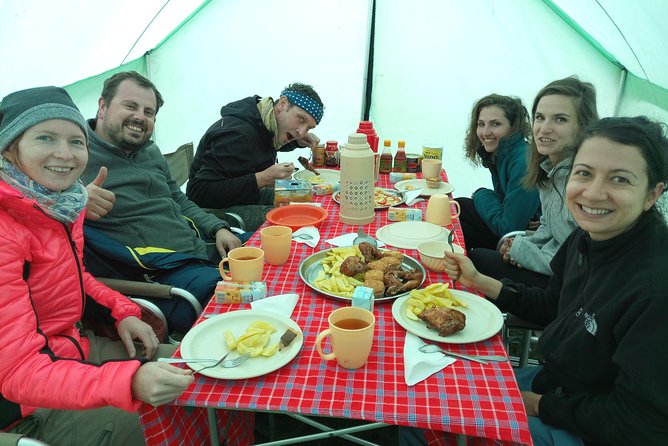
The Lemosho route climbing Mt. Kilimanjaro is priced from $3,100.00 per person, with free cancellation up to 24 hours before the experience starts. Based on reviews from reputable travel platforms like Viator and Tripadvisor, the tour boasts a perfect 5.0 overall rating across 10 total reviews, with no less than 4-star assessments recorded.
| Rating | Number of Reviews |
|---|---|
| 5 stars | 10 |
| 4 stars | 0 |
| 3 stars | 0 |
| 2 stars | 0 |
| 1 star | 0 |
The overwhelmingly positive reviews highlight the exceptional value, organization, and safety measures provided by the tour operators, making this Kilimanjaro expedition a top choice for adventurous travelers.
Packing List

What essential items should climbers pack for the Lemosho route on Mt. Kilimanjaro? Proper preparation is key, as the expedition requires trekkers to carry all their personal belongings and gear for the duration of the 8-day journey.
Hikers must bring warm, layered clothing, including thermal underwear, fleece jackets, and weatherproof outer shells. Sturdy, broken-in hiking boots, gaiters, and trekking poles are also musts.
Other necessities include a sleeping bag rated for sub-freezing temperatures, a headlamp, water bottles or hydration packs, snacks, and basic first-aid supplies.
Porters will carry the bulk of the group’s shared equipment, but each climber is responsible for their own personal items.
Thoughtful packing ensures comfort and safety on the challenging Lemosho traverse of Kilimanjaro.
Acclimatization and Training

Proper acclimatization and physical training are of paramount importance for successfully tackling the Lemosho route on Mt. Kilimanjaro, as the high altitudes and demanding terrain pose significant challenges.
Participants should commence their training regimen well in advance, gradually building up their cardiovascular fitness and muscular endurance through activities like hiking, cycling, and strength training.
Adequate hydration and rest are also crucial during the acclimatization process. On the trek, the guides will monitor each climber’s progress and adjust the pace accordingly to minimize the risk of altitude sickness.
Slow, steady ascents and proper hydration are key to allowing the body to adapt to the changing environment and increasing elevations.
With the right preparation and precautions, the Lemosho route can be conquered safely and enjoyably.
Tipping and Gratuities

Alongside the physical and logistical preparations for the Lemosho route, climbers should also consider the gratuities expected for the dedicated mountain crew who will support them throughout the journey. Tipping is a common practice on Kilimanjaro treks and serves as an important way to acknowledge the hard work and expertise of the guides, porters, and cooks who make the expedition possible. The following table outlines the recommended tipping amounts per climber for the various roles:
| Role | Tip per Climber (USD) |
|---|---|
| Head Guide | $20 – $30 |
| Assistant Guide | $10 – $15 |
| Porter | $5 – $10 |
| Cook | $5 – $10 |
Tipping can be done in cash at the end of the trek and is greatly appreciated by the experienced crew who work tirelessly to ensure a safe and successful climb.
Frequently Asked Questions
What Is the Weather Like During the Trek?
The weather during the trek can be highly variable. Temperatures range from freezing at the summit to mild at the lower elevations. Hikers will encounter a variety of conditions, including sun, wind, rain, and even snow, depending on the route and time of year.
Can I Rent Equipment On-Site?
Yes, hikers can rent equipment on-site for the trek. The tour provider offers sleeping mats, 4-season mountain tents, and an emergency first-aid kit, which are included in the tour package. Hikers can also rent additional gear as needed.
How Difficult Is the Lemosho Route Compared to Other Routes?
The Lemosho route is considered one of the more challenging routes up Mt. Kilimanjaro. It’s longer and involves more ascending and descending than other routes, requiring a high level of physical fitness and endurance from climbers.
Can I Bring My Own Food and Snacks?
While participants are provided meals and drinking water throughout the trek, they’re welcome to bring their own snacks and supplementary food if desired. The tour operator can accommodate special dietary requests with advance notice.
What Cultural Experiences Are Included in the Itinerary?
The tour doesn’t include any specific cultural experiences. It’s focused on the physical challenge of climbing Mt. Kilimanjaro. Participants might have opportunities to interact with local porters and guides, but there aren’t any planned cultural activities on the itinerary.
Recap
The 8-Day Lemosho Route climbing Mt. Kilimanjaro offers an unforgettable trekking experience.
With its gradual ascent, expert guidance, and essential amenities, this route enhances the chances of reaching the summit safely while immersing travelers in the stunning landscapes and diverse wildlife of Tanzania.
Whether seeking a challenging adventure or a breathtaking journey, the Lemosho Route is an exceptional choice for those looking to conquer Africa’s highest peak.
More Tour Reviews in Moshi
Not for you? Here's more things to do in Moshi we have recnetly reviewed
- 7 Days Mid Range Tanzania Wildlife Safari
- Private Multi Day Safari Tour in Tanzania
- Private Kilimanjaro Hike 7 Day Lemosho Route
- 1-Day Moshi Villages Bike Tour
- Chemka Hotsprings
- 6-Days Mt. Kilimanjaro Bike Trek -With- BURIGI CHATO SAFARIS CO L.T.D
- 7 Days Lemosho Route Kilimanjaro Climbing | Solely Tours
- West Kilimanjaro Cycling Adventures
- 8 Days Lemosho Route Climbing Mt. Kilimanjaro
- Moshi City Bike Day Trip
- The Best 7 Days Kilimanjaro Hiking Machame Route in & 2025
- 6 Days Tanzania Budget Camping Safari With Migration
